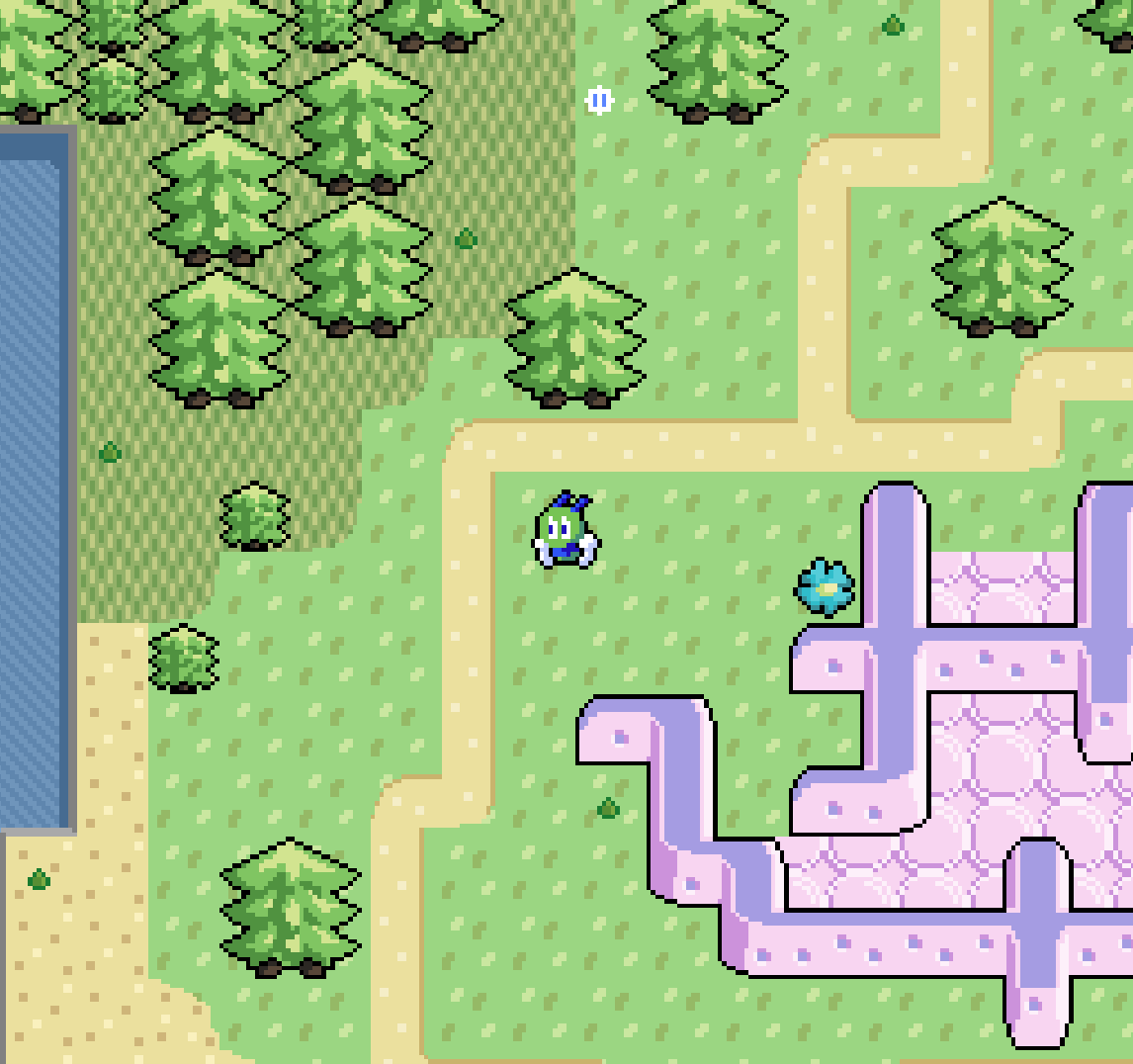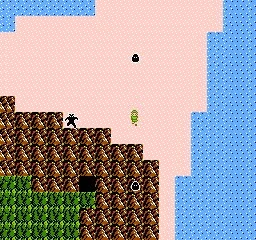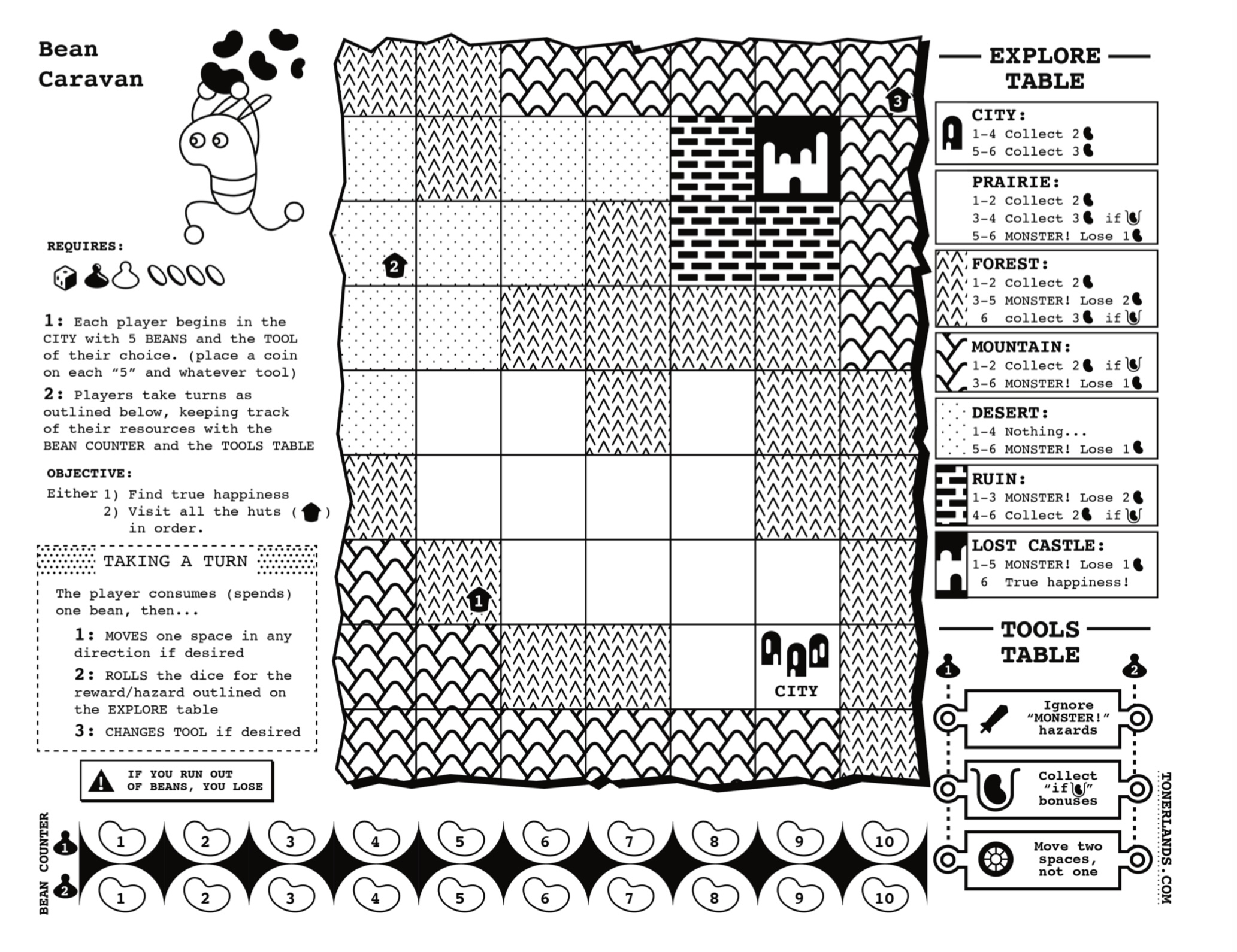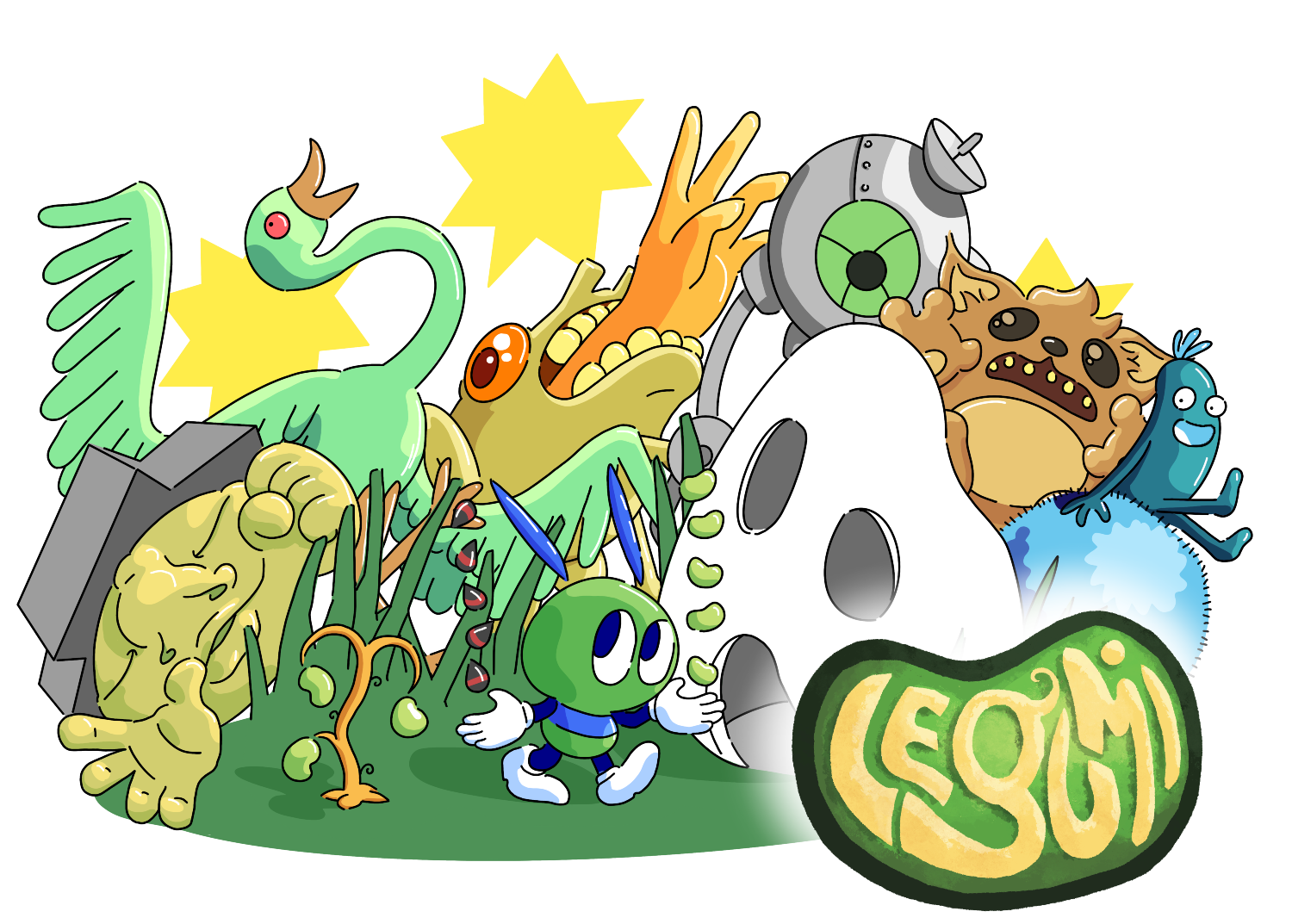Legumi Postmortem
True happiness is out there somewhere! Better get going!
The game
Legumi is a retro-styled adventure game about eating beans and finding True Happiness. It’s a simple-but-tough resource management challenge wherein you take your delicate, short-sided little adventurer from beanstalk to beanstalk, and try to keep them alive while starling away monsters, uncovering hidden treasure, and seeking wisdom.

The concepts behind the main mechanics.
I've always really loved the sense of scale offered by the world in Zelda II.
That game is divided into close-up side-scrolling segments where most of the action happens, and a zoomed out map that you traverse between bits of action. I’ve always imagined that what you can see on the overworld are the limits of Link’s vision; the edges of the screen representing the horizon from his perspective. There are places on the map, like towns and monsters, that you can step onto to "investigate" more closely.

However there are a couple secret places, such as Bagu’s house, that are totally invisible that you need to walk directly on top of to find. It made sense to me that Link should be able to see these things if he was closeby, even if he couldn’t tell what they were until he got very near. There are also things like cave entrances that Link could see far off at the horizon I feel should be a bit more hidden. I imagined one solution to this problem could be that these things could appear as a little glisten on the map when Link got close enough to it to realize *something* was there, prompting him to investigate closer. It wasn't enough to carry an entire game, but I decided to hold onto that idea in case I wanted to use it in something of my own.
Legumi’s other major concept comes from an exploration of a print-and-play board game called Bean Caravan I’d created a few years prior. In that game, you played a bug, and the goal was to find True Happiness (Which I just found a bit more interesting than “FINISH”). To find it, you would have to collect and ration beans, manage your abilities, and assess your risks; then finally either descend into an especially dangerous ruin, or take a long trek around the corners of the map to each of the "huts" on the board. I always felt the game had potential, and would think from time to time about ways it could be made into a "real" game. I had trouble coming up with concepts that added complexity without compromising the simplistic nature of it. A game about “collecting beans and finding true happiness” shouldn’t be too complex, after all.

The epiphany came while I was thinking about Bean Caravan and my overworld map glisten idea at the same time. If Bean Caravan II was a video game, I could add quite a bit of complexity but maintain simplicity, by letting the player play, and the CPU keep track of data and dice rolls. I could add in beans, monsters, and other things as glistening points of interest, which could shuffle around every play, making each game an exciting new experience. It even also made sense that a small bug character walking along the ground wouldn’t be able to see very far ahead. (Don’t @ me, flat-earthers.)
Development
I made a quick prototype to see if this game would be any fun, and found that even just running around a small room without any monsters, exploring for beans to keep yourself alive, was quite thrilling.
The original Bean Caravan didn't have much in the way of combat, but I had come up with a battle system for its potential board game sequel that I'd had a lot of fun with. Basically, when you eat a bean to stay alive, that bean is converted into a bit of random combat power that you can spend on monsters to *hopefully* shoo them away. More dangerous-looking monsters would require you to bet more of this power, and you could only get more of that power by exploring around and eating beans. The system required a bit too much accounting for a supposedly simple board game, but worked beautifully in my prototype.
A few months from then, I would have a booth at a local comic expo's artist alley. The thought occurred that I could perhaps have enough of the game done by then that I could launch an IndieGoGo or something, and promote it there.
Once I had a small demo completed, I passed it around to people for feedback. I pressed on, addressing most of the qualms, and encouraged by the positive statements. Development was going very smoothly. The game's plan was kept simple; I wanted the game to be "long enough to be a surprise bargain," and "polished in the areas where it counted." Beyond that, I was really only interested in getting it finished.
I actually realized that if I cut a couple planned features, I might be able to have the entire game finished by the art expo, not just a demo and an IndieGoGo promise. This became my new goal; I would work on it for a bit before and after work every day, a few hours every weekend, do planning on my lunch breaks, and create art assets while “relaxing”. It would be hectic, but with good time management, I figured I might be able to pull it off. (And if I couldn’t pull it off, what was I doing making a game about time management?)
With about a month left, I asked an old friend, Madi Mhyre, if she could create some music for me, even though I wouldn’t be able to pay her. She agreed! I kept my instructions for each track kindof vague; the important thing was that she was enjoying herself while composing. She ended up making exactly what I wanted anyways, especially the Final Level and True Happiness themes. (I still owe her lunch...)
While I didn’t get every desired feature in the game, and would have liked a bit of extra time for polish and quality of life improvements, I did have the game finished in time! Personally, I think it turned out well. It’s challenging, and a bit tricky to adjust to at the start, but once you get going, it’s a cheeky, addictive little time killer you can play over and over.
Marketing
I haven’t done a tremendous amount of marketing. There was the aforementioned art expo, at which I sold download cards for $5. I sold a few! A lot of people mentioned that I needed a screen, or some sort of interactive display, as they’d almost missed it. I wish I had sold more, but considering my development budget was $0, my few sales still make Legumi substantially more successful than the metaverse. (Thanks for the confidence boost, Zuck!)
My entire life was this game for a bit, so I’m taking a bit of a break to cool down and work on other projects. It was suggested by someone to do a low-ask IndieGoGo to be able to port the game to Mac, and maybe phones, while also finishing up the missing features. It’s a great idea, and something I might look into. I almost feel it would have been easier to sell people on a crowdfunding campaign than the full release.
I want to give it to streamers but I don’t know anything about that world. I enjoy the occasional edited Let’s Play, but haven’t spent enough time in the streamer world to know where to give my download codes. If anyone has any advice to offer, or would like to play the game on their stream, please let me know.
While life gets hectic again before Christmas, I figured I’d take another quick stab at getting the game out there by writing this little post-mortem and mentioning it at a couple places.
Lessons
- Feedback is actually kindof hard to find, but very valuable.
- Don’t be afraid to use good ideas on small projects.
- Finishing a relatively unambitious project feels much better than never finishing an ambitious one.
- A video game at an art expo is a TOUGH SELL. Make sure to have a screen somewhere doing something.
- Make friends with people who make the type of art you don’t, and always be nice to them.
- Save systems are hard. Don’t leave implementing them until the last minute.
- Pausing, for that matter, is also surprisingly hard to incorporate towards the end. While playtesting, pause CONSTANTLY to make sure everything pauses correctly.
- We live in an age where you can dial back your vision, and then add it back later. It’s kindof inelegant, but it’s better than nothing.
If anyone has any questions, feel free to leave a comment below or email me at webmaster@teddykaboom.com
I also have a newsletter, because I make other things besides games and like to talk about it.
Thank you for reading! Have a nice day.
EDIT:
I chose Game Maker as my engine because I've been using it since high school and I knew I didn't need the game to be terribly complex, just finished quickly. I think if I were starting my game design journey from the very beginning now, I might learn Godot or Unity for the flexibility.
Get Legumi
Legumi
Manage your beans and find true happiness in a world full of treasure and monsters.
| Status | Released |
| Author | Teddykaboom |
| Genre | Adventure, Survival |
| Tags | 2D, Cute, Difficult, JRPG, Pixel Art, Retro, Short, Singleplayer, Top Down Adventure |
| Languages | English |
More posts
- Legumi 2.1! (Oops, I mean 2.3)May 28, 2023
- Legumi version 2.0 is live!Mar 29, 2023

Comments
Log in with itch.io to leave a comment.
I was happy to be one of the sales at the art expo, and I sent a few game fans to your table from where my friend and I were also exhibiting in artist's alley at the expo. We also showed off the download card in a Youtube video where we discussed our respective hauls from the expo.
Best of luck in the future Teddy, it was great to meet you!
I got a bit stuck at the end of the third world, I think (still looking for that last hidden hut) but I've enjoyed my time with the game thus far.
Hello,
I remember a bunch of people coming by specifically to look at the game, that must have been you! Thanks so much for the support.
I do worry that I've maybe made the beginning of the game a bit too hard! I might think about doing a walkthrough for the first few levels. All I'll say is that the items are expensive but helpful, especially the wizwhere early on.
I'd actually be interested in seeing that video, compare my own haul. X) Is it still available?
We mention you around the 22 min mark of the video on Youtube:
Thank you! I overdid it with the download cards, but I met some nice people and that's the real reason to do those things anyways!
I really wish they'd make another game like Zelda II, but I suppose all the best aspects of it have been stripped for parts and used elsewhere at this point. Oh well! We'll always have the improvement patch.
Thanks for the insightful dev article! There are some really good points in it.
I especially like the point made: "Finishing a relatively unambitious project feels much better than never finishing an ambitious one." Some people describe that as "feature creep" where more and more features creep up and are added to the original scope of the game, and so it never gets actually finished.
That is something I am aiming for in my first few projects: limited scope or limited ambition, so that the projects actually get finished. If nothing else, these smaller-scope projects can give a wealth of development experience to the author(s), even possibly preparing an author for subsequent larger-scope projects or specializations in a particular aspect of game development.
Thanks again for sharing your dev experiences and insights in this article.
Thanks for reading and taking the time to respond!
It's honestly been great just to have something to point at when people ask if I've done anything. AND, once you've made and wrapped something, you're aware of the million tiny time-sucking mistakes that you get to avoid in the future. (Seriously, the pain of implementing pausing was the biggest shock) and then that should allow you to make bigger and bigger projects.
Good luck with your first few projects!